 My seven-year-old son has dyscalculia, and is also facing memory issues. Is medical intervention required?
My seven-year-old son has dyscalculia, and is also facing memory issues. Is medical intervention required?
— Rishika Singh, Delhi
If you suspect that your son has dyscalculia i.e, a math learning disorder, and is experiencing memory issues, it’s advisable to consult a child psychologist for a complete evaluation. A professional assessment will identify the nature and severity of his learning difficulty and recommend appropriate interventions.
In the meantime, provide your son learning support at home. You could use visual aids and practice basic math concepts with him. Also talk to special educators at his school and ask for extra support.
I am a math teacher for classes III-VIII. I have a few children with learning problems in my class. What strategies can I use to help them?
— Rizwan Sheikh, Hyderabad
As a math teacher, it’s important to understand that students with dyscalculia have difficulty understanding basic numerical concepts and arithmetic skills such as counting and number recognition.
Here are some techniques you can use to support them:
- Use multi-sensory pedagogies
- Break down math problems into small steps
- Provide additional practice
- Use technology
- Provide positive reinforcement
- Work closely with parents
Remember that every child with dyscalculia is different. So it’s important to be patient, flexible and adapt your teaching strategies to meet individual needs.
My ten-year-old daughter has difficulty learning mathematics. In my childhood, I also struggled with maths. Is dyscalculia inherited from parents?
— Leena Thomas, Thiruvananthapuram
Dyscalculia is a learning disorder that affects a person’s ability to understand numbers. Typically, it’s not inherited from parents, in the same way as other genetic conditions. However, there is some evidence to suggest that dyscalculia may have a genetic component, as it often runs in families.
Environmental factors such as lack of exposure to math concepts or inadequate instruction could also contribute to dyscalculia. It is important to note that struggling with math does not necessarily mean your daughter has dyscalculia. It is possible that she merely needs additional support in school and at home to improve her skills.
I recommend you consult a counsellor or special educator who will conduct a thorough assessment and offer recommendations for appropriate interventions.
(Shubhada Shekar is a counselor and special educator, Christ Nagar Public School, Trivandrum)























